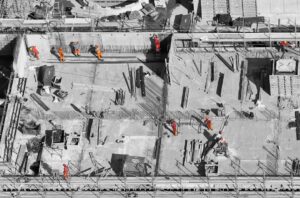Property development project management is the process of overseeing and coordinating all aspects of a property development project, from the initial planning stages to the final completion. It involves managing various tasks such as budgeting, scheduling, resource allocation, and quality control to ensure that the project is completed on time, within budget, and to the desired specifications.
The importance of project management in property development cannot be overstated. Without effective project management, a property development project can quickly become chaotic and disorganized, leading to delays, cost overruns, and a subpar end result. Project management provides structure and organization to the entire process, ensuring that all tasks are completed in a timely manner and that resources are allocated efficiently.
Key Takeaways
- Property development project management involves overseeing the planning, design, construction, and marketing of a property development project.
- Efficiency is crucial in property development to ensure that projects are completed on time, within budget, and to the desired quality standards.
- Planning and scheduling are essential for maximizing efficiency in property development, including setting clear goals, timelines, and milestones.
- Effective communication is critical in property development to ensure that all stakeholders are informed and aligned throughout the project.
- Utilizing technology can help streamline project management in property development, including tools for project tracking, collaboration, and reporting.
Importance of Efficiency in Property Development
Efficiency is crucial in property development for several reasons. Firstly, efficient project management helps to minimize costs by ensuring that resources are used effectively and wastage is minimized. This is particularly important in property development where budgets can be tight and any cost savings can have a significant impact on the overall profitability of the project.
Secondly, efficiency helps to reduce project timelines by streamlining processes and eliminating unnecessary delays. This is important because time is money in property development, and any delays can result in increased costs and lost opportunities.
Finally, efficiency improves the overall quality of the project by ensuring that tasks are completed to the highest standards and that all necessary checks and inspections are carried out. This is important because quality is a key factor in determining the success of a property development project.
Planning and Scheduling for Maximum Efficiency
Planning and scheduling are essential components of effective project management in property development. Proper planning allows for a clear understanding of the project objectives, timelines, and resource requirements. It helps to identify potential risks and challenges early on so that they can be addressed proactively.
Scheduling involves breaking down the project into smaller tasks and assigning specific timelines for their completion. This helps to ensure that all tasks are completed in a logical sequence and that there are no unnecessary delays or bottlenecks.
To plan and schedule effectively, it is important to involve all relevant stakeholders and gather their input. This helps to ensure that everyone is on the same page and that there is a shared understanding of the project goals and requirements. It is also important to regularly review and update the plan and schedule as the project progresses to accommodate any changes or unforeseen circumstances.
Effective Communication in Property Development
| Metrics | Description |
|---|---|
| Number of communication channels | The number of different ways communication is being delivered to stakeholders |
| Response time | The time it takes to respond to inquiries or concerns from stakeholders |
| Clarity of message | The level of clarity and understanding of the message being delivered to stakeholders |
| Frequency of communication | How often communication is being delivered to stakeholders |
| Feedback received | The amount and quality of feedback received from stakeholders |
| Resolution rate | The percentage of issues or concerns that are resolved through effective communication |
Effective communication is crucial in project management as it ensures that all team members are on the same page and working towards a common goal. It helps to prevent misunderstandings, conflicts, and delays, and promotes collaboration and teamwork.
To communicate effectively in property development, it is important to establish clear lines of communication and ensure that all team members have access to the necessary information and resources. Regular meetings and updates should be scheduled to keep everyone informed of the project progress and any changes or challenges that may arise.
It is also important to encourage open and honest communication among team members, where everyone feels comfortable expressing their ideas, concerns, and suggestions. This helps to foster a positive working environment and promotes innovation and problem-solving.
Utilizing Technology for Streamlined Project Management
Technology plays a crucial role in streamlining project management in property development. There are various project management tools and software available that can help automate tasks, track progress, and facilitate communication among team members.
For example, project management software such as Trello or Asana can be used to create task lists, assign responsibilities, set deadlines, and track progress. This helps to ensure that all tasks are completed on time and that there is visibility into the overall project status.
Collaboration tools such as Slack or Microsoft Teams can be used to facilitate communication among team members, allowing for real-time messaging, file sharing, and video conferencing. This helps to improve communication and collaboration, particularly in remote or distributed teams.
Managing Budgets and Resources

Managing budgets and resources effectively is crucial in property development to ensure that the project remains financially viable and that resources are allocated efficiently. This involves creating a detailed budget that takes into account all costs associated with the project, including construction, materials, labor, permits, and contingencies.
To manage budgets effectively, it is important to regularly track and monitor expenses against the budget and make adjustments as necessary. This helps to identify any cost overruns or savings opportunities early on and allows for timely corrective actions.
Resource management involves allocating resources such as labor, equipment, and materials in the most efficient manner possible. This requires careful planning and coordination to ensure that resources are available when needed and that there is no wastage or duplication.
Delegating Tasks and Responsibilities
Delegating tasks and responsibilities is an important aspect of project management in property development. It involves assigning specific tasks to team members based on their skills, expertise, and availability.
Delegating tasks helps to distribute the workload evenly among team members and ensures that each task is assigned to the most qualified person. This helps to improve efficiency and productivity as team members can focus on their areas of expertise.
To delegate tasks effectively, it is important to clearly communicate expectations and provide all necessary information and resources. Regular check-ins should be scheduled to monitor progress and provide guidance or support as needed.
Maintaining Quality Control throughout the Project
Maintaining quality control throughout the project is crucial in property development to ensure that the end result meets the desired standards and specifications. This involves implementing quality control processes and procedures at every stage of the project, from design and planning to construction and finishing.
To maintain quality control, it is important to establish clear quality standards and guidelines that all team members are aware of. Regular inspections should be conducted to ensure that all work is being carried out to the required standards and that any issues or defects are identified and addressed promptly.
It is also important to involve all relevant stakeholders in the quality control process and gather their input and feedback. This helps to ensure that everyone has a shared understanding of the quality requirements and that any concerns or suggestions are addressed.
Handling Changes and Challenges in Property Development
Property development projects often face changes and challenges that can impact the project timeline, budget, and quality. Common changes and challenges include design changes, unforeseen site conditions, weather delays, and regulatory issues.
To handle changes and challenges effectively, it is important to have a flexible and proactive approach. This involves regularly reviewing and updating the project plan and schedule to accommodate any changes or delays. It also involves having contingency plans in place to address unforeseen circumstances or risks.
Effective communication and collaboration among team members are also crucial in handling changes and challenges. Regular meetings should be scheduled to discuss any issues or concerns and to brainstorm solutions. It is important to involve all relevant stakeholders in the decision-making process to ensure that everyone’s input is considered.
Evaluating and Improving Efficiency in Future Projects
Evaluating project efficiency is important in property development to identify areas for improvement and to learn from past experiences. This involves conducting post-project reviews to assess the project’s performance against the initial objectives, timelines, and budgets.
To evaluate efficiency effectively, it is important to gather feedback from all relevant stakeholders, including team members, clients, contractors, and suppliers. This helps to gain different perspectives and insights into the project’s strengths and weaknesses.
Based on the evaluation findings, improvements can be made in future projects by implementing lessons learned, adopting best practices, and making necessary adjustments to processes or procedures. Regular monitoring and tracking of key performance indicators can also help to identify any inefficiencies or bottlenecks early on.
Efficient project management is crucial in property development to ensure that projects are completed on time, within budget, and to the desired specifications. It involves effective planning and scheduling, communication, resource management, and quality control. By implementing the tips and strategies discussed in this article, property developers can improve their project management practices and achieve greater efficiency in their projects.
If you’re a property developer looking to enhance your project management skills, you may also be interested in learning how to create engaging content with minimal effort. Oloyeaa.com offers valuable insights on this topic, providing tips and strategies to help you effectively communicate with your target audience while saving time and resources. Check out their article on creating engaging content with minimal effort to discover practical techniques that can elevate your marketing efforts and attract more potential buyers or investors to your projects.
FAQs
What is project management in property development?
Project management in property development refers to the process of planning, organizing, and overseeing the various tasks and activities involved in the development of a property. It involves managing resources, timelines, budgets, and stakeholders to ensure that the project is completed on time, within budget, and to the satisfaction of all parties involved.
What are some top project management tips for property developers?
Some top project management tips for property developers include setting clear goals and objectives, creating a detailed project plan, establishing a realistic budget, communicating effectively with stakeholders, managing risks and issues, and monitoring progress regularly.
Why is effective communication important in project management for property developers?
Effective communication is important in project management for property developers because it helps to ensure that all stakeholders are on the same page and working towards the same goals. It also helps to identify and address any issues or concerns that may arise during the project, and to keep everyone informed of progress and changes.
What are some common challenges faced by property developers in project management?
Some common challenges faced by property developers in project management include managing multiple stakeholders with different priorities and expectations, dealing with unexpected delays or changes, staying within budget constraints, and ensuring that the project meets all regulatory requirements.
How can project management software help property developers?
Project management software can help property developers by providing a centralized platform for managing all aspects of the project, including tasks, timelines, budgets, and communication with stakeholders. It can also help to automate certain processes, such as scheduling and reporting, and provide real-time visibility into project progress and performance.




